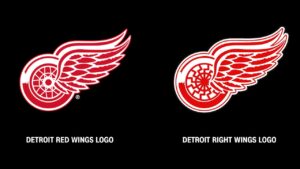Confederate flags were not the only symbol used by white nationalists marching in Charlottesville, Virginia.
To the dismay of the Detroit Red Wings hockey team – so was their logo. Well almost.
On the left is the Detroit Red Wings logo; on the right is the white nationalist group’s logo:

image courtesy of CNN
The spokes in the wheel on the Detroit Right Wings’ logo were altered to resemble the Nazi SS lightning bolt.
The Detroit Red Wings quickly disavowed any affiliation:
“[t]he Detroit Red Wings vehemently disagree with and are not associated in any way with the event taking place today in Charlottesville, Va. The Red Wings believe that hockey is for everyone, and we celebrate the great diversity of our fan base and our nation. We are exploring every possible legal action as it pertains to the misuse of our logo in this disturbing demonstration.”
Do the Detroit Red Wings have a case against the white nationalists for trademark infringement?
As mentioned in one of last week’s blog posts, Is Pandora PayPal?, courts rely on a factor analysis to determine whether there is a likelihood of confusion between two marks. It would be difficult for the Detroit Red Wings, or the NHL, to establish these factors – that consumers were confused into marching with the white nationalist group believing it to be affiliated with the Detroit Red Wings.
However, an owner of a famous mark has another remedy for unauthorized use of its mark. When a person uses a famous mark, the owner may have a cause of action under the Federal Anti-Dilution Act. While the basis for trademark infringement is consumer confusion, the basis for a dilution action is consumer perception of the famous mark.
There are two types are harm that arise from dilution: blurring and tarnishment.
Trademark dilution through blurring (15 U.S.C. § 1125 (c)(2)(B)) is the most common type of trademark dilution. It occurs when the identity of a mark is weakened (or blurred) through its unauthorized use on dissimilar products.
Trademark dilution through tarnishment (15 U.S.C. § 1125 (c)(2)(C)) occurs when the unauthorized user uses the mark in connection with goods or services that degrade the brand, or replace the positive associations with negative associations. There have been several mainstream cases of trademark dilution through tarnishment. For example, an adult novelty shop named “Victor’s Little Secret” was sued by Victoria’s Secret. Moseley v. V Secret Catalogue, Inc., 537 U.S. 418 (2003). The Sixth Circuit upheld an injunction barring the defendant from using the mark “Victor’s Little Secret.”
Here, the slightly modified Detroit Red Wings logo was used as a symbol to represent an anti-immigrant section of white nationalists. Assuming the Detroit Red Wings’ logo is a famous mark, the white nationalists’ use of that logo strikes at the heart of the dilution by tarnishment statute.
If you need assistance deciding whether your trademark has been infringed, diluted or tarnished, or if someone has accused you of trademark infringement, dilution or tarnishment, contact Kaitlin Corey at kcorey@gdldlaw.com, Jim Astrachan at jastrachan@gdldlaw.com, or Donna Thomas at dthomas@gdldlaw.com.
